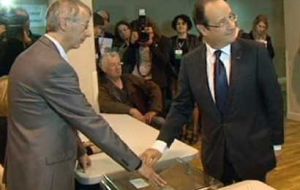MercoPress. South Atlantic News Agency
Hollande set to consolidate power with a working majority in the Lower House
 All exit polls indicate the Socialist president will have at least 289 seats in the National Assembly
All exit polls indicate the Socialist president will have at least 289 seats in the National Assembly Socialist President François Hollande looked set to consolidate his grip on power with a left-wing majority in parliament after a first-round vote on Sunday, and may be able to govern without relying on hard leftists hostile to closer European integration
Initial projections by polling agencies based on a partial vote count suggested his core Socialist bloc could win 283 to 329 seats in the 577-member National Assembly in next Sunday’s runoff, shifting the lower house to the left for the first time in a decade.
With Greens allies, the left would have 295 to 347 seats, the CSA polling institute forecast, well ahead of the mainstream conservatives with 210 to 263 seats, and more than the outright majority of 289 needed to give Hollande a free hand.
The Ipsos institute drew similar conclusions from its own projections based on a partial vote count, while TNS Sofres was the only pollster that put the Socialists and Greens just short of an absolute majority in a worst-case scenario.
The vote was another symbolic advance for the left after it took control of the Senate in 2011 and won the presidency in May for the first time since 1988.
A low turnout of less than 60%, which analysts say plays against the left, could still curb what might have been a bigger triumph for Mr. Hollande as he seeks to steer France through the Euro zone’s debt crisis.
“There is a winner on the left, but not a big winner. It is a relative majority and not an absolute majority. In a crisis there was a need for an absolute majority,” said analyst Stephane Rozes at the CAP political consultancy.
President Hollande, who won the presidency as much due to a rejection of conservative Nicolas Sarkozy and his inability to curb raging unemployment as on his own merit, needs to be able to rule unfettered as he prepares budget adjustments in Europe’s second-biggest economy, including possible spending cuts.
He is also under pressure from Berlin to agree to hand European Union institutions more control over national budgets and move towards a fiscal union – measures that would be opposed by the Communists and the hard Left Party in parliament.
The parliamentary balance is hard to predict accurately because any candidate winning more than 12.5% of registered voters can go through to the June 17 second round, meaning three candidates may face off in many constituencies.
The far-right National Front won about 13.4% of the popular vote, less than its leader Marine Le Pen’s 17.9% presidential score, and is projected to have at most three deputies. The anti-immigration party will be present in fewer runoffs than it had hoped due to the low turnout.
In the short term, the lower house will be called on to vote on tweaks to the 2012 budget and tax increases for the rich as Hollande seeks to implement a tax-and-spend programme that aims to create jobs without imposing Greek-style austerity.




Top Comments
Disclaimer & comment rulesCommenting for this story is now closed.
If you have a Facebook account, become a fan and comment on our Facebook Page!